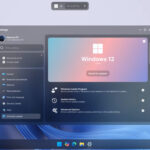How to address cloud-native security risks in 2025

Gartner predicts that public cloud end-user spending will surpass $675 billion by the end of 2024. In 2025, as AI systems proliferate and organizations increasingly store sensitive data in public cloud infrastructure, many stakeholders will begin demanding more robust cloud security measures.
Additionally, cybercriminals are becoming more inventive than ever. They now rely on AI and machine learning (ML) to improve and iterate on their methods, just as we all do. Interestingly, despite advances in cloud security, research suggests that common vulnerabilities like unenforced multi-factor authentication (MFA) and long-lived credentials continue to expose many companies to risk. Patching these known vulnerabilities will be crucial next year.
Waiting for Microsoft Windows 12 is a mistake when you can upgrade to Linux today

The tech world is full of rumors about Windows 12, the supposed savior of Microsoft’s operating system lineup. The company has been tight-lipped about details, but leaks suggest it’s aiming to be a more cloud-focused, AI-driven operating system. That all sounds fancy, but here’s the truth -- waiting for Windows 12 might not be the smart play. If you’re tired of the bloat, the constant updates, and the never-ending resource demands, there’s an alternative you can embrace today: Linux.
Microsoft has spent years refining Windows, but with every iteration, it seems to get heavier, slower, and, frankly, more intrusive. Windows 12 promises new features like AI enhancements and tighter cloud integration, but do you really need an AI telling you how to use your PC? For most users, these features feel like unnecessary fluff rather than meaningful improvements. Instead of waiting for an operating system that may or may not meet your needs, you could switch to Linux -- a free, lightweight, and privacy-respecting solution that puts you in control.
Elon Musk’s Tesla adds SiriusXM to Model 3, Model Y, and Cybertruck

Elon Musk’s Tesla has expanded its entertainment offerings by integrating SiriusXM into its Model 3, Model Y, and Cybertruck vehicles. This marks the first time SiriusXM has been made available in these popular electric vehicles, which rank among the top-selling EVs in the United States. Owners can now access SiriusXM’s broad catalog of audio content with a one-month free trial requiring no credit card. Subscribers also gain access to the service outside their vehicles via the SiriusXM app and connected devices.
As part of Tesla’s 2024 Holiday Update, this integration provides a SiriusXM experience customized for Tesla’s in-car system. The platform offers a wide array of content, including ad-free music channels spanning all genres and decades, customizable artist stations, and a comprehensive selection of podcasts. Sports fans can enjoy live coverage and analysis from over 20 channels, while news and entertainment are delivered through dozens of talk-focused stations.
Open source supply chain faces security issues

The open source software supply chain shows signs of 'AppSec exhaustion,' with organizations showing diminished engagement in security practices and struggling to meet vulnerability management goals, according to a new report.
The study from Snyk, based on a survey of 453 professionals across application development and security, shows that open-source security is more important than ever, as hackers have recognized the efficiency of targeting open-source software as a single entry point to multiple orgs.
New platform lets developers build more accurate AI apps faster

High-quality retrieval is key to delivering the best user experience in AI search and retrieval-augmented generation (RAG) applications.
Knowledge platform Pinecone has announced new vector database capabilities combined with proprietary AI models to help developers build more accurate AI applications, faster and more easily.
Managing the shift to machine-to-machine communication [Q&A]

As AI continues to evolve, it will enable machines to communicate in new, dynamic, autonomous ways without human intervention.
This machine-to-machine growth has a huge potential to impact industries from smart factories to energy. We spoke to John Kim, CEO of API communication specialist Sendbird, to discuss these changes and how they will affect business.
Windows 12 is everything Windows 11 should be -- and the Microsoft OS we deserve!

Microsoft is preparing to end free support for Windows 10 next year, although users will have the option to pay for continued security updates if they choose. While it’s possible to keep using the popular operating system safely, most people will face two choices: upgrade to Windows 11 or wait for the eagerly anticipated next-generation OS, widely expected to be called Windows 12.
Although Microsoft has yet to officially reveal its plans for the future of Windows, we have an idea of what it could look like.
NixOS 24.11 Vicuña Linux distribution debuts with GNOME 47 and Plasma 6

NixOS 24.11 Vicuña is finally here after a brief week-long delay. The Linux distribution, known for its modularity and unique package management system, has been updated with new features, packages, and improvements. NixOS packages aren’t limited to the distribution itself -- they can also be used on other Linux systems and macOS, giving users flexibility beyond the standard installation. This latest release will receive bug fixes and security updates until June 31, 2025.
The development effort behind this version is impressive. A total of 2,669 contributors worked on 49,079 commits to bring this release to life. The team added 8,141 new packages, updated 20,975, and removed 3,970 to maintain security and manageability. Beyond packages, NixOS includes modules and tests that are integral to its functionality. This update introduces 119 new modules while retiring 30. Additionally, 1,706 options were added, and 556 were removed.
Adlink launches EMP100 mini PC for smart retail and industrial use

Adlink Technology has introduced its new EMP100 Mini PC, a compact device aimed at both smart retail and industrial sectors. With its small size (13 x 10.7 x 2.8cm) and fanless design, this versatile machine promises to handle tasks like digital signage, IoT applications, and edge computing in space-constrained environments.
Powered by Intel Celeron processors (N6210/J6412), the EMP100 supports dual 4K displays through two HDMI ports, making it a solid option for eye-catching digital signage or interactive kiosks. It also includes IoT connectivity with a single GbE LAN port and offers optional Wi-Fi 6 and Bluetooth 5.2. Expansion options are available with M.2 slots for storage or wireless modules, allowing for some customization.
Security must be used as a springboard, not just a shield

Cybersecurity is often frustratingly seen as a boardroom burden -- a compulsory cost to keep threats at bay. This “necessary evil” mindset is holding businesses back and leading to a critical opportunity to leverage security as a driver of success being missed.
It’s time we looked at cybersecurity investments differently. Rather than the board reluctantly seeing the investments solely as a necessity for threat prevention, organizations should see cybersecurity also as a powerful enabler of productivity and growth. As digital transformation accelerates across manufacturing, healthcare, and other critical infrastructure sectors where cyber-physical systems (CPS) underpin operations, security needs to keep up with the pace of innovation, supporting -- and even driving -- new efficiencies, customer trust, and competitive advantages which all come with improving cyber and operational resilience.
Best Windows apps this week

Six-hundred-twenty-three in a series. Welcome to this week's overview of the best apps, games and extensions released for Windows 10 and Windows 11 on the Microsoft Store and elsewhere in the past seven days.
Microsoft confirmed several issues this week that affect Windows 11, version 24H2. One plagues Ubisoft gamers in particular.
Australia passes social media ban for under 16s

After a period of intense public and political debate, Australia has approved laws that will ban anyone under the age of 16 from using social media.
While the laws were passed yesterday, it may well be a year until they come into effect -- and they will be the strictest in the world. Once in force, tech companies such as Meta could be hit with fines of up to AUS$50 million (US $32.5 million) for failing to comply.
The crucial role of data pipelines in building strong GenAI apps [Q&A]

For GenAI to live up to its promise reliable flow of data is key. AI models are only as good as the data pipeline connections bringing in quality data.
Outdated connections mean more hallucinations and untrustworthy results with data engineers hopelessly trying to manually integrate hundreds of AI data feeds. We spoke to Rivery co-founder and CEO Itamar Ben Hemo to discuss why good data pipelines are key to success.
Proving Linux is not a safe sanctuary, ESET finds first Linux-targeting UEFI bootkit malware

Linux-based operating systems have long been heralded as being inherently more secure than Windows. Whether or not this is true is open to debate, as is the impact of user numbers on making an OS a target for malware writers.
A key security concern in recent times has been UEFI bootkits, and it has been something affecting only Windows-based systems. Now, however, security firm ESET has revealed details of Bootkitty, the first UEFI bootkit designed for Linux systems.
Firefox for Linux switches to .tar.xz packaging for smaller downloads and faster installation

Mozilla has updated its packaging format for Firefox on Linux, moving from .tar.bz2 to .tar.xz. The switch, which uses the LZMA compression algorithm, results in smaller download sizes -- up to 25 percent smaller -- and faster decompression times, improving installation efficiency.
The .tar.xz format is widely supported across modern Linux distributions, ensuring compatibility while saving bandwidth. Current users won’t need to take any action, as Firefox will continue updating as usual. However, the new format is now available for Firefox Nightly and will roll out to Beta and Release channels in the coming weeks.
Most Commented Stories
© 1998-2025 BetaNews, Inc. All Rights Reserved. About Us - Privacy Policy - Cookie Policy - Sitemap.




